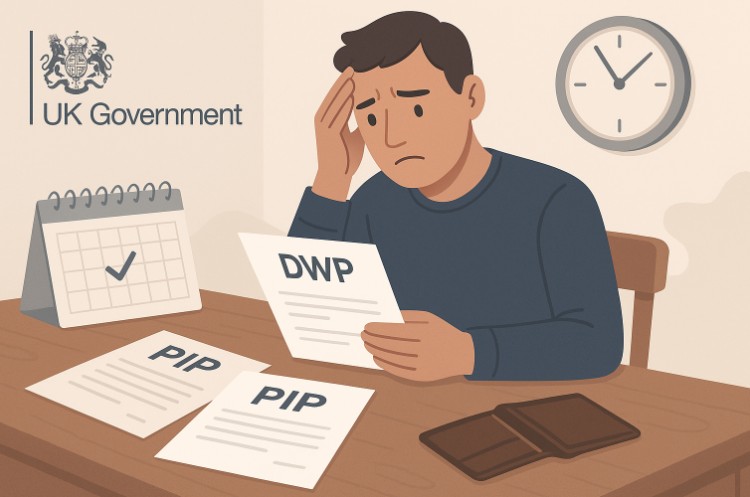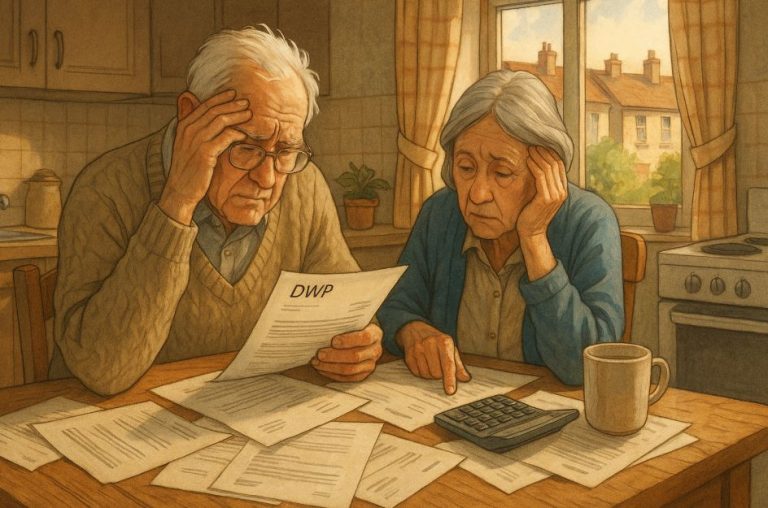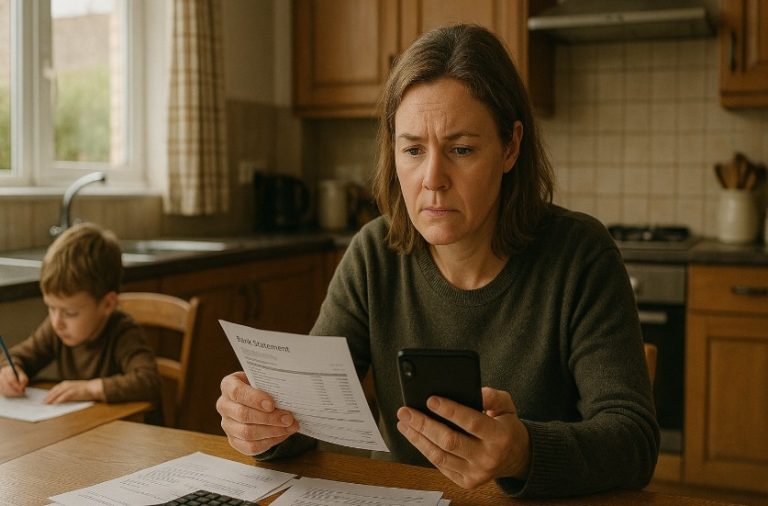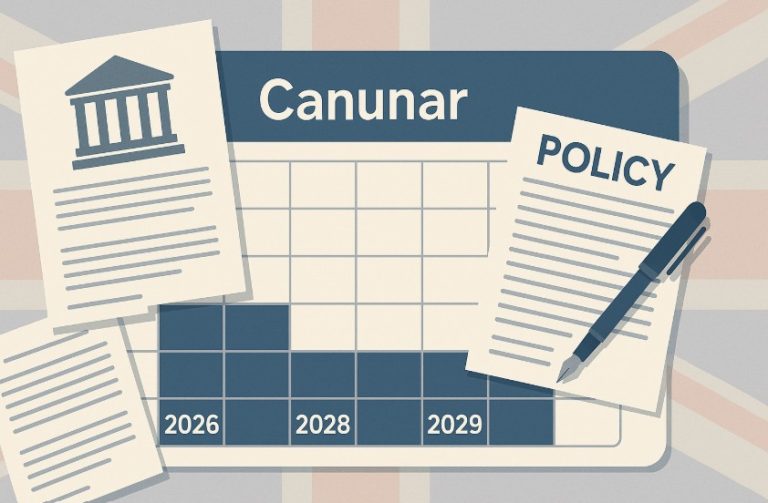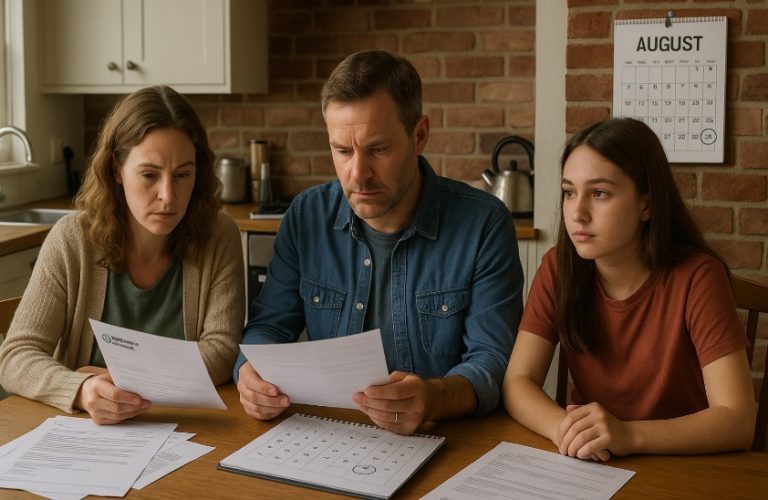Navigating the UK benefits system can be confusing, especially when it involves combining different forms of support.
Many families rely on both Disability Living Allowance (DLA) and Universal Credit, and understanding how one may impact the other is essential.
This article explores whether DLA affects Universal Credit, how the two benefits interact, and what you need to know to maximise your entitlements.
What Is Disability Living Allowance (DLA) and Who Is Eligible?
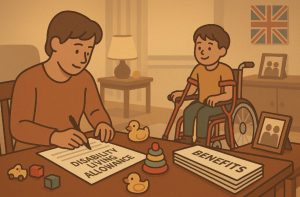
Disability Living Allowance (DLA) is a benefit for children under 16 who need extra help because of a disability or health condition. The benefit is non-means-tested, which means that it is not based on income or savings.
It includes two components:
- Care Component: For children who need help with personal care or supervision
- Mobility Component: For children who have difficulty getting around
To qualify, the child must have had the condition for at least three months and be expected to continue having it for at least another six months.
The level of support and payment depends on the severity of the child’s condition and the care or supervision required.
Unlike other benefits, DLA is not affected by household earnings, savings or employment status.
What Is Universal Credit and How Does It Work with Other Benefits?
Universal Credit is a means-tested benefit for people in or out of work with low income. It replaces six existing benefits including Income Support, Jobseeker’s Allowance and Child Tax Credit.
It combines several elements to determine the total payment:
- Standard allowance
- Child elements (including disabled child additions)
- Housing costs
- Limited capability for work elements
- Carer element
Payments are made monthly and adjusted depending on household income, savings and family circumstances.
The benefit is designed to provide financial support in a simplified structure. However, it takes into account most forms of income except for non-means-tested benefits such as DLA and PIP.
Does DLA Count as Income When Applying for Universal Credit?
DLA is completely disregarded in the income assessment for Universal Credit. Since it is a non-means-tested benefit, it does not reduce your Universal Credit payment.
This includes both the care and mobility components. Whether the payment is made for the claimant or a dependent child, it will not be considered part of the household income.
This treatment ensures that:
- Families receiving DLA are not penalised in their Universal Credit calculations
- The payment remains protected and separate from other benefits
- It allows recipients to access additional support, such as the disabled child addition
Can You Claim Both DLA and Universal Credit at the Same Time?
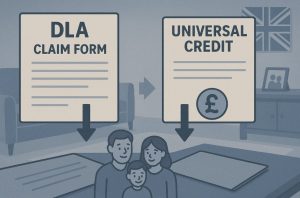
Yes, it is entirely possible to claim both Disability Living Allowance (DLA) and Universal Credit (UC) at the same time, and for many families, doing so provides much-needed financial support.
While these two benefits serve different purposes and are assessed differently, they are designed to work alongside each other, particularly in households that include a disabled child.
DLA is a non-means-tested benefit, which means your income, savings, or employment status do not affect your entitlement to it. It is awarded solely based on the additional care and/or mobility needs of a child under 16.
Universal Credit, on the other hand, is a means-tested benefit, which assesses your household income, savings, and other circumstances to determine how much support you’re entitled to.
The important point is that DLA is not treated as income when calculating your Universal Credit. This means receiving DLA does not reduce your UC payment.
In fact, DLA can have the opposite effect it can increase your Universal Credit because of the additional support UC provides for households with disabled children.
This support comes in the form of the disabled child element (also known as the disabled child addition), which is automatically applied to your Universal Credit award once the DWP is notified of a DLA award for your child.
You do not need to submit a separate application for this addition, but you must report your child’s DLA award through your Universal Credit online journal or by contacting the DWP directly.
Key points about claiming both DLA and Universal Credit:
- You must report your child’s DLA award to Universal Credit to ensure the correct support is added.
- If your child is awarded a higher rate of care under DLA, your Universal Credit could increase significantly.
- Claiming both benefits can help cover not only daily living costs but also additional care, therapy, and transportation expenses that come with raising a child with a disability.
Claiming both benefits also does not affect other support like housing costs under Universal Credit, which remain separate from the DLA award.
Additionally, the presence of a child on DLA may also reduce your work-related requirements under Universal Credit.
For instance, parents of disabled children receiving DLA may be exempt from full work search or availability obligations depending on the level of care required.
In short, families can and often do benefit from both DLA and Universal Credit, with the interaction between the two leading to increased financial assistance rather than deductions.
How Does DLA Affect the Disability Element of Universal Credit?
When a child receives Disability Living Allowance, it can directly affect the household’s Universal Credit through the disabled child addition.
This is an extra element added to the Universal Credit calculation to provide financial help to families raising a child with a disability.
The disabled child addition is based on the care component rate of the child’s DLA award. There are two levels of this addition:
| DLA Care Component Level | Universal Credit Addition | Monthly Amount (2024/25) |
| Lowest or Middle Rate Care | Lower Disabled Child Addition | £158.76 |
| Highest Rate Care | Higher Disabled Child Addition | £495.87 |
This addition is included in your Universal Credit award automatically after the DWP processes your child’s DLA claim and links it to your UC case. You will see this reflected in your monthly breakdown.
The level of support this element provides is significant. For families receiving the higher rate care component, the additional £495.87 per month can make a major difference in affording specialist care, therapies, respite services, or adapting the home to suit the child’s needs.
This extra amount:
- Is not affected by income from employment or self-employment
- Is not reduced by savings or other benefit payments
- Continues as long as the child qualifies for DLA and is part of your Universal Credit household
Even if you are working or self-employed, you can receive this element as part of your UC payment, making it one of the few additions that supports working families as well as those out of work.
It’s also worth noting that receiving the disabled child addition may influence other aspects of your Universal Credit responsibilities.
Parents may qualify for reduced work-related requirements, meaning fewer expectations to search for or be available for work.
This can help parents focus on caregiving responsibilities without the pressure of meeting job-seeking conditions.
In some cases, families with more than one disabled child may receive multiple additions, each calculated separately based on the child’s DLA care rate.
If the child transitions from DLA to PIP at age 16, and the PIP assessment results in an award, the disabled child addition may convert into the Limited Capability for Work or Work-Related Activity element (if applicable), depending on the circumstances and additional assessments.
To ensure the correct element is applied:
- Report your child’s DLA award to Universal Credit as soon as it starts
- Keep the DWP informed of any changes to the award, especially if it increases or decreases
- If your child is awarded the highest rate of care, ensure that is reflected in the higher addition
Failing to report these changes promptly could delay payments or result in underpayments that require backdating.
Are There Other Benefits That Interact with DLA and Universal Credit?
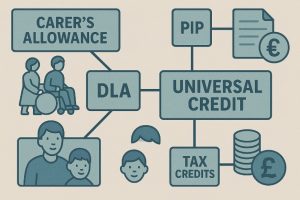
Receiving DLA can help unlock other forms of financial assistance. It does not directly reduce Universal Credit, but some of the additional benefits related to DLA may have an impact depending on how they are categorised.
Some relevant benefits and interactions include:
- Carer’s Allowance: If a parent or guardian provides regular care for a child receiving DLA (middle or high care rate), they may qualify. However, Carer’s Allowance is counted as income for Universal Credit and could reduce the monthly UC payment.
- Motability Scheme: Available to those receiving the high rate of the mobility component. It offers leasing options for accessible vehicles.
- Council Tax Reduction: Many local councils offer reduced Council Tax bills for households receiving DLA.
- Tax Credits: Although gradually being replaced by Universal Credit, some households still receiving Child Tax Credit may get additional payments due to DLA.
- Free School Meals and Healthcare: Eligibility for certain services may be extended if a child is in receipt of DLA.
Here’s a comparison of how benefits interact with DLA and Universal Credit:
| Benefit Type | Impact of DLA | Impact on Universal Credit |
| Carer’s Allowance | May become available | Counted as income, can reduce UC |
| Tax Credits | May increase due to DLA | Phasing out; not available with UC |
| Motability Scheme | Eligible with high mobility rate | No impact on UC |
| Council Tax Reduction | Often increased with DLA | Separate from UC |
| Free School Meals | DLA supports eligibility | Not counted in UC income |
These combinations can provide a more stable financial situation, but it is essential to monitor changes that could affect overall income levels and entitlements.
What Changes Should You Report to Universal Credit If You Receive DLA?
Even though Disability Living Allowance (DLA) is disregarded as income in Universal Credit calculations, it’s still essential to report any changes related to DLA to the Department for Work and Pensions (DWP).
These updates ensure that your Universal Credit award reflects your current circumstances and that you’re receiving the correct amount of financial support.
Failing to report changes could result in overpayments, underpayments, or potential penalties, including repayment demands. Below are the key changes that must be reported, broken down into categories for better understanding.
New DLA Awards for a Child in Your Household
If your child has been newly awarded DLA, you must inform Universal Credit immediately. This could significantly increase your entitlement due to the disabled child addition.
What to report:
- Start date of the DLA award
- The care component rate (lowest, middle, or highest)
- The mobility component rate (if applicable)
Once you report this, the DWP will adjust your Universal Credit payment to include the correct disabled child element.
Changes to the DLA Award Amount or Rate
If your child’s DLA is reviewed and the rate of care or mobility component changes, you must update Universal Credit. The disabled child addition in your UC award is based on the care rate, so any change can increase or decrease your entitlement.
Key changes to report:
- An increase from middle to highest rate care (which may qualify you for the higher disabled child addition)
- A reduction in care rate that may remove the higher addition or result in a lower payment
- Any mobility changes, while they don’t directly impact UC, may affect eligibility for other benefits like Motability or Carer’s Allowance
The DLA Award Is Stopped or Ends
If your child’s DLA is stopped after reassessment, non-renewal, or a failed appeal, this must be reported immediately to Universal Credit. The removal of the disabled child addition will impact your total UC payment.
Circumstances that can lead to DLA stopping:
- A failed reassessment due to not meeting care or mobility thresholds
- DLA not renewed or a decision not appealed
- The child leaves the household or moves to live with someone else
Failing to report this could lead to overpayment, which the DWP may recover.
Your Child Turns 16 and Transfers to PIP
DLA for children stops at age 16, and a claim for Personal Independence Payment (PIP) must be made to continue receiving disability support. If your child transitions to PIP, and they are still part of your Universal Credit household, their new benefit must be reported.
Important points:
- Report the end of DLA and the start of PIP as separate events
- If PIP is awarded, Universal Credit may apply a different element such as Limited Capability for Work or Work-Related Activity
- If the PIP assessment is delayed, notify Universal Credit to avoid gaps in support
This transition is critical for maintaining continuity in financial assistance, especially if your household relies on the higher disabled child element.
Change in Caring Responsibilities
If someone in your household begins or stops caring for a child who receives DLA, this could affect Carer’s Allowance or the Carer element within Universal Credit.
Scenarios to report:
- A parent or guardian starts providing care for 35+ hours a week (may qualify for Carer’s Allowance)
- A carer moves out of the household or can no longer provide the necessary care
- You stop receiving Carer’s Allowance or lose eligibility due to changes in DLA
Since Carer’s Allowance is treated as income for Universal Credit purposes, any change can directly impact your monthly UC award.
Your Child Leaves the Household
If the child who receives DLA no longer lives with you (e.g. moves in with another parent, relative, or into care), you must inform Universal Credit.
Your eligibility for the disabled child addition and other elements related to that child would end from the date they leave.
Situations to report:
- Change in custody or living arrangements
- Child is placed in residential care or foster care
- Child moves to live independently and no longer forms part of your UC claim
Not reporting this type of change could result in overpayments that will be reclaimed by the DWP.
Any Other Significant Change Affecting DLA or UC
There are other circumstances that, while not directly related to DLA, can still affect your UC entitlement:
- If the child’s condition improves and they no longer meet DLA criteria
- If the child passes away
- If there’s a change in your UC claimant status, income, or housing situation that affects the household’s entitlement
These should be reported through your Universal Credit online journal, by calling the DWP, or through a face-to-face appointment if required.
What Should You Do If Your DLA Is Stopping or Switching to PIP?
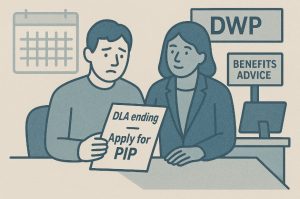
When a child receiving DLA turns 16, they are expected to undergo an assessment for Personal Independence Payment (PIP), which is the adult equivalent of DLA.
It’s important to prepare for this transition:
- Apply for PIP before the child turns 16 to avoid payment gaps
- Inform the DWP and Universal Credit about the switch
- Monitor whether the new PIP award entitles the household to a disability addition within Universal Credit
While PIP continues to be disregarded for income assessments, any gap in benefits or change in the level of care awarded could affect Universal Credit payments.
Seek advice from welfare advisers or disability-focused charities if you’re unsure how the switch may impact your entitlements. They can help with the application and ensure continuous support through the transition.
How Can You Get Help Understanding Your DLA and Universal Credit Entitlements?
If you’re unsure how your benefits interact, especially when caring for a disabled child, support is available.
Services that offer guidance include:
- Citizens Advice: Provides local and national advice on benefit entitlements and appeals
- Contact: A charity that specialises in supporting families with disabled children
- Turn2us and entitledto: Online benefit calculators that help determine what you may be eligible for
- Local Authority Welfare Rights Teams: Often available through your council’s website or family support services
- DWP Universal Credit Helpline: Offers official guidance for current claimants
Getting advice early can help prevent miscalculations or delays and ensures that you’re accessing the correct level of support.
Conclusion: What’s the Bottom Line on DLA and Universal Credit?
In summary, Disability Living Allowance does not reduce Universal Credit payments—in fact, it may increase them through the disabled child addition. Since DLA is non-means-tested, it is disregarded in the Universal Credit calculation.
Families with disabled children can receive meaningful financial support from both benefits, and DLA may also open the door to additional entitlements like Carer’s Allowance or Council Tax Reduction.
To make the most of these supports, ensure accurate reporting and seek help if you’re unsure about any changes.
Frequently Asked Questions
Is DLA included when calculating Universal Credit payments?
No, DLA is disregarded in the Universal Credit income calculation. It does not reduce the amount you receive.
Will losing DLA reduce my Universal Credit award?
Yes, if you were receiving the disabled child addition because of DLA, losing DLA may lower your Universal Credit payment.
Does child DLA increase Universal Credit?
Yes, child DLA can result in a higher Universal Credit amount through the disabled child addition, depending on the DLA care rate.
Can I receive PIP and Universal Credit together?
Yes, PIP, like DLA, is also disregarded as income and may entitle you to extra elements within Universal Credit.
What happens to Universal Credit if DLA stops?
If DLA ends, your Universal Credit may be adjusted. You should report the change immediately to avoid overpayments.
Does DLA affect the work capability assessment in Universal Credit?
While DLA doesn’t affect the assessment directly, it may provide supporting evidence of a health condition or disability.
Is there an age limit for claiming DLA alongside Universal Credit?
Yes, DLA is only for children under 16. After that, they must apply for Personal Independence Payment (PIP).


